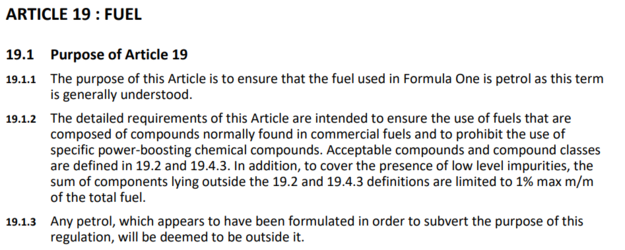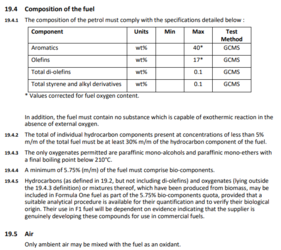I'm also still interested in knowing what the Ferrari deal was regarding their over-performing engine that was hushed up by the FIA.
Me too... We know they were running a higher fuel flow rate (that much is in the public domain), and so if they'd had the standard 100kg of fuel in the tank, they would have run out of fuel well before the end of the race. And we know that you have to have a certain volume left in the tank at the end for the mandatory sample. The Astons fell foul of that last year, losing them a podium.
F1 did go through a phase of using really trick fuels, additives, chilling the fuel to get more into the tank (back then, fuel was by volume not by weight at ambient temperature under current rules) and thus being able to run a much richer mixture, but then they pulled the plug on all that and specified pump fuels. Makes you wonder how "pump fuel" the pump fuel actually is...

And whether someone might have had a finger on the scales somewhere so they could put more into the tank to allow them to run that increased fuel rate.
From F1's commercial standpoint, it makes sense to have Ferrari being competitive, as they have such a massive global following. As Sam Bird said on the R5 commentary, it's not a car brand, it's a religion. So all the marketing, merchandise, bums-on-seats at the circuits and such...
But apart from brief bursts of competitiveness, Ferrari are generally typically Italian - badly organized, full of infighting between drivers and between team personnel, bumbling, making stupid mistakes. The history of F1 is littered with the evidence. The cynic in me says they need that, erm, "helping hand" to stop them from reverting true-to-type.
I will admit I'm not a Ferrari fan and never really have been. My allegiances to teams and drivers have been reasonably peripatetic since the early 90s as interest has waxed and waned, although these days, I'm firmly a McLaren / Lando Norris kind of girl.


 And whether someone might have had a finger on the scales somewhere so they could put more into the tank to allow them to run that increased fuel rate.
And whether someone might have had a finger on the scales somewhere so they could put more into the tank to allow them to run that increased fuel rate.

